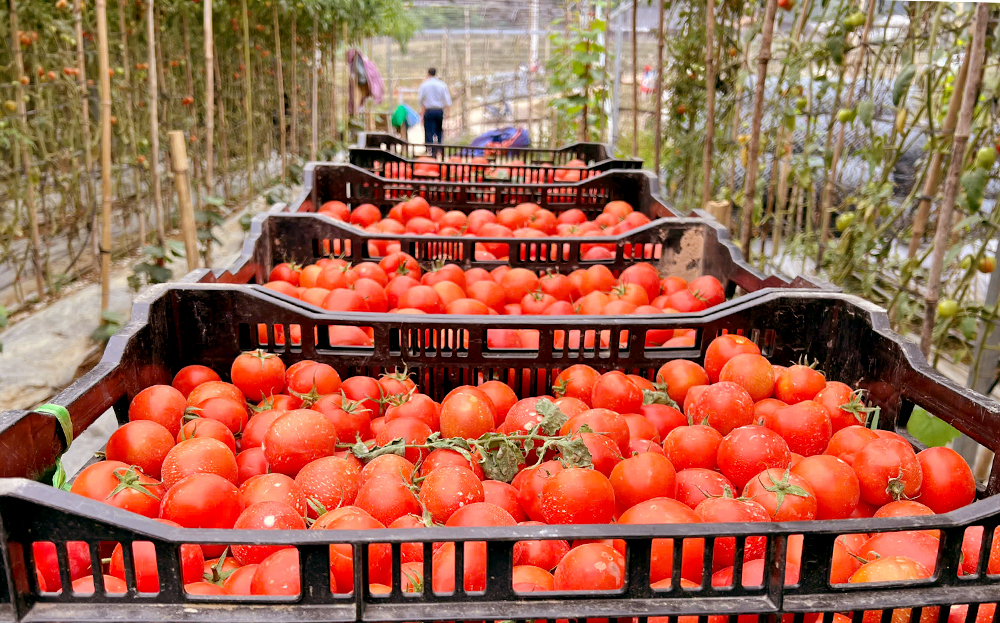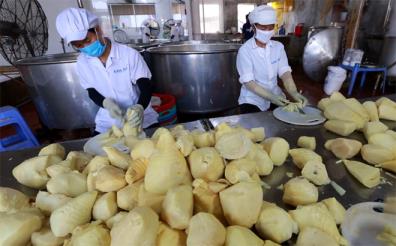In 2023, recognizing the economic efficiency of tomatoes grown in Da Lat and the similarity in climate between Da Lat and Mu Cang Chai, Giang A Mui from Nam Khat Commune boldly rented nearly 2 hectares of underperforming farmland to build greenhouse facilities and cultivate Beef tomatoes originating from Israel.
Mui shared, "The tomato production process follows VietGAP standards, ensuring high yield and quality, ranging from 50 to 70 tons per hectare. Beef tomatoes cook quickly, have a high starch content, and are aromatic, making them highly popular among consumers. After harvesting, we pack the tomatoes in plastic crates and transport them for wholesale at markets in Vinh Phuc and Hanoi, with seasonal prices ranging from 10,000 to 40,000 VND per kilogram.”
Currently, Nam Khat Commune has over 100 hectares of agricultural land, primarily single-crop fields or areas with low-yield crops. These lands have been leased to enterprises, cooperatives, and individuals to transition into cultivating higher-value crops. Today, the commune’s central fields are covered with roses, tomatoes, chili peppers, and vegetables. This crop restructuring has increased local residents' average income to over 46 million VND per person annually, nearly tripling since the beginning of the term.
Dinh Hang Gang in Lao Chai Commune, rows of vibrant green chayote plants cultivated by the T&D Clean Agricultural Cooperative are in full harvest. Established in 2019 with seven members, the cooperative focuses on producing vegetables and fruits, with chayote as the primary crop cultivated on 12 hectares. The entire farming process adheres to organic practices.
On average, the cooperative supplies 7 to 10 tons of chayote daily. Beyond major markets, their products are also provided to communal kitchens and schools within and outside the district. With its sweet flavor, appealing appearance, and high quality, the cooperative's chayote was certified as a 3-star OCOP product in 2023. Recently, buyers from India and Taiwan have expressed interest in importing the product, prompting the cooperative to expand its cultivation area with a goal of supplying 15 to 20 tons daily.
Building on its climate and soil advantages, Mu Cang Chai has established various agricultural production areas, such as over 50 hectares for organic vegetables and crops like shiitake, oyster mushrooms, and bell peppers, 100 hectares for roses, and more than 700 hectares for high-quality rice varieties such as Tan and Seng Cu sticky rice. The district currently boasts 10 agricultural products with 3-star OCOP certification and expects to add five more by the end of 2024. These key local agricultural products are grown, harvested, and processed sustainably with stable market demand.
Additionally, the district has effectively implemented its fruit tree development plan for 2021–2025 and its medicinal plant development plan for 2021–2025, with a vision toward 2030. Efforts to promote and support these initiatives have resulted in nearly 450 hectares of fruit trees, over 100 hectares of which are yielding approximately 400 tons annually, and over 2,600 hectares of medicinal plants producing more than 2,350 tons annually. Key medicinal crops include amomum, coix, cynomorium songaricum rupr, pseudoginseng, morinda officianalis, and various types of ginseng.
As an upland locality primarily reliant on agriculture, Mu Cang Chai prioritizes encouraging farmers to adopt scientific and technological innovations in farming. The district continues to plan concentrated production zones to facilitate the application of advanced techniques while creating favorable conditions for enterprises and individuals to invest in clean and high-tech agriculture. This includes accessing preferential policies on land use, tax exemptions, and credit support.
To further promote high-quality agricultural production, the district actively raises awareness among businesses, cooperatives, and farmers about the benefits of clean and safe farming. This strategy aims to enhance product reliability, competitiveness, and branding, paving the way for smart agriculture and distinguished local agricultural products.
Thanh Chi








